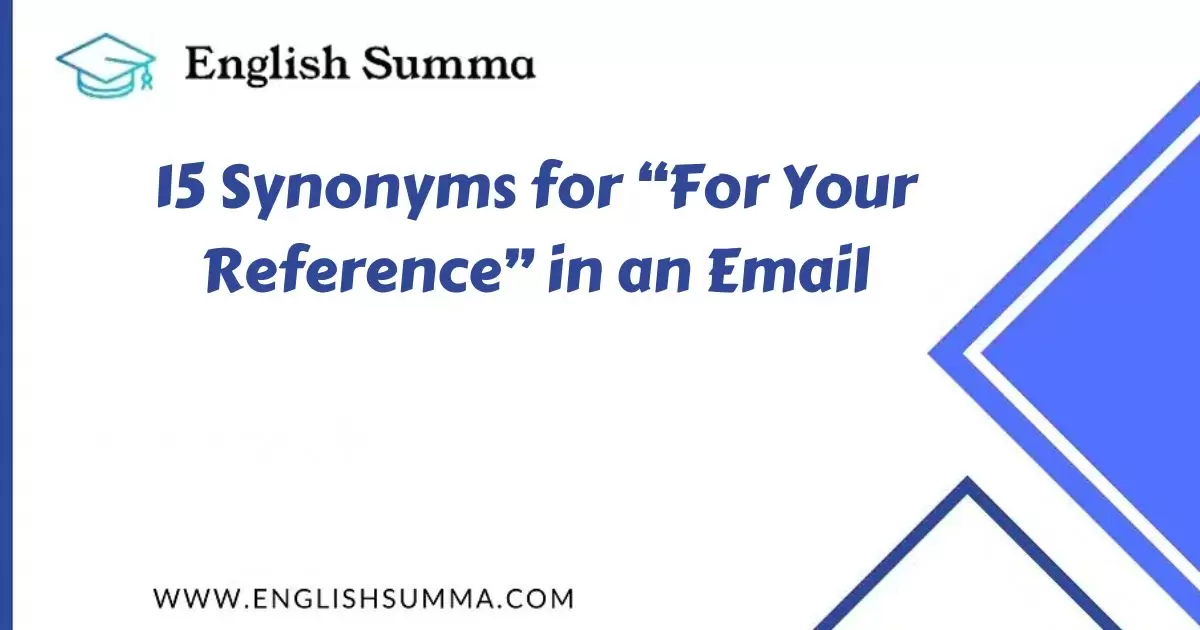Introduction
In the realm of professional email communication, clarity, conciseness, and courtesy are paramount. One common phrase employed to signal the sharing of information without necessitating immediate action is “For Your Reference.”
While this phrase serves its purpose effectively, diversifying your email vocabulary can add nuance and polish to your correspondence. In this article, we delve into 15 synonyms for “For Your Reference,” exploring their nuances and providing scenario examples to illustrate their appropriate usage.
From the succinct “FYI” to the informative “Helpful Insight,” each synonym offers a unique tone and implication, allowing you to tailor your message to fit various communication contexts.
Whether you seek to convey urgency, provide gentle reminders, or simply share valuable information, these alternatives offer a spectrum of options to elevate your email communication. Join us on this journey as we explore the versatility and effectiveness of these synonyms in enhancing your professional correspondence.
1. “FYI”
In professional correspondence, the acronym “FYI” is widely recognized as a succinct way to convey that information is being shared purely for the recipient’s awareness, without requiring any immediate action. It stands for “For Your Information,” and it’s commonly used in emails to distribute updates, reports, or other relevant data.
Scenario Example:
Subject: Quarterly Sales Report FYI
Hi Daniel,
I hope this email finds you well. I wanted to share the quarterly sales report with you FYI. Please take a look when you have a moment. Let me know if you need any further details.
Best regards,
Adam
2. “Reference”
The term “Reference” serves as a subtle way to indicate that the information provided in the email is intended for the recipient’s use as a point of reference, without implying any immediate action.
Scenario Example:
Subject: Meeting Agenda Reference
Dear Daniel,
Attached is the agenda for our upcoming team meeting for your reference. Feel free to review it beforehand and let me know if there are any additional items you’d like to discuss.
Best regards,
Adam
Read More: Synonyms for “Thank You for Sharing”
3. “As a Reminder”

Using the phrase “As a Reminder” politely draws attention to important information that the recipient may need to recall or keep in mind.
Scenario Example:
Subject: Project Deadline As a Reminder
Dear Daniel,
I’m writing to you as a reminder that the deadline for submitting the project proposal is approaching. Please ensure all necessary documents are finalized and submitted by the end of the week.
Thank you,
Adam
4. “For Your Information”
“For Your Information” is a direct way of informing the recipient that the content of the email is intended to provide them with valuable information.
Scenario Example:
Subject: Policy Update For Your Information
Hi Daniel,
I wanted to inform you for your information that there has been a recent update to our company’s remote work policy. Please review the attached document for details.
Best regards,
Adam
5. “Informative Note”
“Informative Note” implies that the content of the email contains important or useful information that the recipient may find beneficial.
Scenario Example:
Subject: Product Launch Informative Note
Dear Daniel,
I’m sending this email to provide you with an informative note regarding the upcoming product launch. Please find attached the latest marketing materials for your review.
Best regards,
Adam
6. “Helpful Reminder”
A “Helpful Reminder” serves to gently prompt the recipient’s memory or draw attention to important details they may have overlooked.
Scenario Example:
Subject: Monthly Budget Review Helpful Reminder
Hi Daniel,
Just a helpful reminder to complete your monthly budget review by the end of the week. Let me know if you need any assistance with the process.
Best regards,
Adam
7. “Useful Info”

“Useful Info” conveys that the content of the email contains information that may be beneficial or advantageous to the recipient.
Scenario Example:
Subject: Conference Details Useful Info
Dear Daniel,
I’m sharing some useful info regarding the upcoming industry conference. Please review the attached itinerary for details about the schedule and speakers.
Best regards,
Adam
8. “Handy Note”
A “Handy Note” implies that the information provided in the email is convenient or useful for the recipient to have on hand.
Scenario Example:
Subject: Networking Event Handy Note
Hi Daniel,
Just a handy note to remind you about the networking event next week. I’ve included the event details below for your convenience.
Best regards,
Adam
9. “Quick Reminder”
A “Quick Reminder” succinctly draws attention to important information that the recipient may need to recall promptly.
Scenario Example:
Subject: Team Meeting Quick Reminder
Dear Daniel,
This is a quick reminder about our team meeting tomorrow at 10:00 AM. Please make sure to review the agenda beforehand.
Best regards,
Adam
10. “Useful Reference”
“Useful Reference” indicates that the information provided in the email can serve as a valuable point of reference for the recipient.
Scenario Example:
Subject: Training Materials Useful Reference
Hi Daniel,
Attached are the training materials we discussed earlier. These documents will serve as a useful reference as you prepare for the upcoming workshop.
Best regards,
Adam
11. “Convenient Note”
A “Convenient Note” suggests that the information contained in the email is conveniently provided for the recipient’s benefit.
Scenario Example:
Subject: Travel Itinerary Convenient Note
Dear Daniel,
I’m sending this email as a convenient note to share your travel itinerary for the upcoming business trip. Please review the details and let me know if any adjustments are needed.
Best regards,
Adam
12. “Informative Reference”
“Informative Reference” communicates that the content of the email is informative and serves as a point of reference for the recipient.
Scenario Example:
Subject: Project Guidelines Informative Reference
Hi Daniel,
I’m forwarding you the project guidelines as an informative reference. Please review them carefully before starting your next assignment.
Best regards,
Adam
13. “Helpful Insight”
“Helpful Insight” suggests that the information provided in the email offers valuable insights or perspectives for the recipient’s benefit.
Scenario Example:
Subject: Market Analysis Helpful Insight
Dear Daniel,
I’ve attached the latest market analysis report for your review. I believe you’ll find it helpful insight as we plan our next marketing campaign.
Best regards,
Adam
14. “Important Note”
An “Important Note” emphasizes the significance of the information provided in the email for the recipient’s attention.
Scenario Example:
Subject: Policy Update Important Note
Hi Daniel,
I’m writing to bring to your attention an important note regarding the recent policy update. Please review the changes outlined in the attached document.
Best regards,
Adam
15. “Useful Reminder”
A “Useful Reminder” serves to prompt the recipient’s memory or provide valuable information for their benefit.
Scenario Example:
Subject: Project Deadline Useful Reminder
Dear Daniel,
Just a useful reminder that the deadline for project submissions is approaching. Please ensure all deliverables are completed and submitted by the end of the week.
Best regards,
Adam
Pros and Cons
Using synonyms for “For Your Reference” in email communication offers several advantages, such as:
Pros:
- Variety: Using different phrases keeps the communication fresh and engaging.
- Clarity: Each synonym may convey a slightly different nuance, allowing for clearer communication based on context.
- Politeness: These synonyms often come across as polite and considerate, enhancing the professional tone of the email.
However, there are also some potential drawbacks:
Cons:
- Ambiguity: Depending on the context, some phrases may be interpreted differently by recipients.
- Overuse: Repeatedly using synonyms for “For Your Reference” may come across as redundant or overly formal.
- Misinterpretation: The intended meaning of some phrases may not always align with how recipients interpret them, leading to misunderstandings.
Conclusion
In conclusion, mastering the art of email communication involves more than just conveying information—it’s about fostering understanding, clarity, and professionalism. By incorporating synonyms for “For Your Reference” into your repertoire, you can add depth and versatility to your emails, ensuring that your messages resonate with recipients in various contexts.
From the straightforward “FYI” to the subtly assertive “Useful Reminder,” each synonym offers a unique tone and implication that can help you tailor your communication to suit the specific needs of your audience.
However, it’s essential to exercise discretion and consider the context and relationship with the recipient when selecting the most appropriate synonym. By doing so, you can effectively convey your message while maintaining a courteous and professional demeanor.
So, the next time you draft an email, consider employing one of these synonyms to elevate your communication and leave a lasting impression on your recipients.

Meet Steven Smith, the driving force behind “English Summa.” Armed with a Bachelor’s Degree in Linguistics and a passion for teaching, Steven is dedicated to unraveling language intricacies for eager minds. Join him on a journey of linguistic discovery through Language Odyssey—a space where education meets inspiration, and the beauty of language unfolds.

